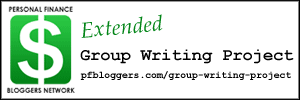With only two payments left on my credit card debt, it’s time to get serious about paying down my ridiculous private student loan debt.
For the past year, I’ve been working hard to claw my way out of leftover debt from college. My first goal was to focus on my high-interest credit card debt. I can’t tell you how thankful I am that we’re almost completely credit-card-debt free just as the financial world is crumbling.
After paying down credit card debt, my next goal is high-interest private student loan debt. My plan was to lower my 8-12% interest rate by consolidating my high-interest private student loans at today’s lower rates. I planned to attack those loans for the next three years until only our low-interest federal debt was left.
I’ve been keeping an eye on two separate lenders for private loan consolidation: CitiBank and Chase. Since it takes about 6 weeks for processing and my forbearance period ends at the end of December, it’s now time for me to apply for these consolidation loans.
Last night I logged into CitiBank’s website to find out what information I would need to gather to apply this week. Unfortunately, it appears that CitiBank has stopped offering this type of loan in the past two weeks. I guess it’s not surprising, but it’s certainly disappointing.
Private student loan consolidation is still listed as an option on the Chase student loan web site. However their information hasn’t been updated since June. It’s highly possible that they’re no longer accepting new applications either. Sigh.
My credit score is excellent, so I’m hoping I’ll be able to find a company that’s still offering private student loan consolidation. Unfortunately, my timing couldn’t be worse. I need to find a lender before December at pretty much one of the worst times in history to get a loan. With lenders cracking down even on credit limits, this type of high-risk private student loan consolidation seems to be next to impossible to get even for people with high credit scores.
We’re currently devoting $325 a month to debt. Without consolidating to a lower interest rate, my monthly payment is about $300. Luckily, we have enough money in our budget to cover the payment as is, but I was hoping to cut our minimum monthly payment in half. If our minimum payment was only $160 and we continued to send $325+ every month, it would greatly reduce the amount of time it took to pay down the debt. If we could gradually raise that amount to $500 a month, we could pay off $20,000 in about three years.
Obviously, things could be much worse. Even if we have to keep the high interest rate for a little longer, we’re still better off than we were a year ago with $4,000 in credit card debt.
I’m grateful that we’re able to make ends meet and save a little money at the same time even as the financial market crumbles around us. It’s still a bummer. I had lofty goals to pay off my private student loan debt in the next three years. If we can’t get a lower interest rate, then that’s clearly not going to happen.
I’m calling Chase tonight to see if I have any options with them. If not, I’ll call my original lender and see if I can bargain for a lower interest rate. I’m hoping I’ll have some bargaining power thanks to my high credit score, but I’m kind of doubting it. With lenders cutting credit limits and saying “see ya” even to responsible borrowers to reduce their credit risk, I’m thinking they’ll be unlikely to take on a loan like this.
Just goes to show how much harder it is to achieve lofty goals in this crazy financial market …
